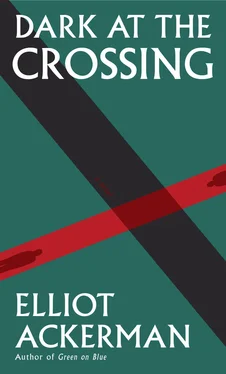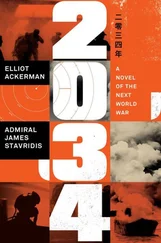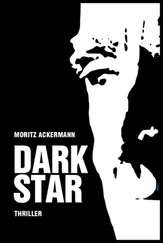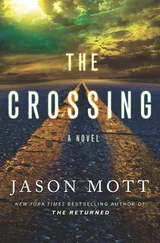Haris checked his phone. Nothing from Saladin1984. It began to rain, and the fighting past the border slowed, its noise becoming softer than the rain. Across the parking lot the midday prayer ended, but everyone remained in the tent, staying warm and dry. Haris put on a waterproof shell he’d kept from his days in Iraq — a pixelated pattern of green, brown, black. The Syrian war had attracted a mishmash of fighters, so even American camouflage would draw little attention.
Behind him, Haris heard the shuffling of feet across gravel. A young man walked stooped over, slow as a grandfather with a bad cane. Holding him by the arm, another man paced alongside. He was a bit older, with a full beard and bloodshot eyes. Slung against his body was a satchel, similar to the kind Haris remembered students wearing when they biked on campus in Dearborn. The pair eased across the parking lot as if they walked on broken glass. They found an outdoor hose coiled in the mud. The stooped-over man wore a sunken, hangdog expression that looked like thirst. His friend turned on the hose, handing it to him. He didn’t drink, not at first. Instead, he unbuttoned his black parka and lifted up his red T-shirt, silkscreened with a heroic profile of Che Guevara. A hastily dressed wound was revealed beneath. As the man peeled duct tape from his torso, Haris realized he’d bandaged himself using a cutout piece of carpet. With his bare skin exposed to the cool air, the man lapped water from the hose against his stomach. Relief spread across his mealy, pockmarked face. He seemed almost to smile. Haris tried not to stare, but managed to catch a glimpse of the wound.
An enormous scar, swollen and dry, ran from the man’s sternum to below his waistband. The pink, riveted holes of recently unthreaded stitches lined the scar, running at perfect intervals, regular as ties down a rail line. The man continued to lap water against his stomach. Then, as if overcome by the sensation, he dropped the hose at his feet.
The hose snaked on the ground, making a puddle. The man with the red, tired eyes bent down, picking it up, taking a drink for himself. With that done, he turned the hose off, chucked it in the mud and helped his friend back across the parking lot. The two tottered slowly toward the café. Choosing to sit outside in the last of the rain would assure them a table once the storm passed and the refugees emerged from the large tent. Haris watched the pair’s slow progress. The man with the scar headed toward him.
“May we join you?” he asked in Arabic.
He was doubled over, as if in more pain after treating his wound. His face was so close Haris could smell his breath, which reeked weakly of medicine.
Haris gestured toward his table’s empty seats. The man with the bloodshot eyes waved toward the café owner and growled: “Thalatha chai!”
The owner disappeared beneath the counter.
The pair exchanged pleasantries with Haris, who introduced himself, giving the courtesy of his full name. The two men replied haltingly, calling themselves only Athid and Saied. Haris sensed these weren’t their real names. Feeling awkward that he wouldn’t be trusted, Haris also felt sympathy. What had each been through and seen that even their identities had become liabilities?
The man with the scar, Saied, pulled a pack of Gauloises from the pocket of his black parka. He offered one to Haris, who refused. He’d quit smoking once he left the States, having his last cigarette outside the terminal at Detroit Metro Airport. Haris had smoked in Iraq, an impulse he’d once struggled to control. He now wanted to feel in control. He wanted this war to feel different than that war.
The man with the bloodshot eyes, Athid, rested his satchel by the leg of his chair and then pulled a book of damp cardboard matches from the pocket of his olive-green field jacket. He handed them to Saied, who struggled to light one. Haris noticed the tips on both Saied’s index fingers were missing, as if they’d been neatly guillotined. Haris fished through his hiking pack for the lighter he’d bought from the boys, passing it to Saied.
“Are you looking at my hands?” Saied asked, striking the lighter.
Haris glanced away. “I meant nothing by it.” Then he slowly turned back toward Saied, who clutched his palms in his lap, the cigarette dangling from his lips.
“You’re not from here,” added Saied. “I can tell from your accent. Are you a journalist, maybe a researcher?” Coming from Saied the words journalist and researcher were as loaded with profanity as the word pimp or pedophile. When confronted with what felt like an accusation, Haris’s reflex was to explain himself.
“I’m American,” he said. “I’ve come to fight with the Free Army.” He had rehearsed the words before but only in his mind. Played out as fantasy, this statement always seemed like a manly declaration of who he’d become. But when spoken in his voice, the words sounded flat and ridiculous. A declaration of nothing.
“An American come to fight with the Free Army. Then you should look at my hands. The Daesh did this,” said Saied, pronouncing the Arabic acronym for the Islamic State in Iraq and al-Sham. He held his fingers up, waving them in front of his face as if he wore many jeweled rings. “To pray, they believe one needs fingers to point toward Mecca. If you don’t believe, you are lost to them. They will disfigure your body in the same way they think your soul is already disfigured.”
The satchel at the foot of Athid’s chair toppled over, moving on its own. Athid snatched it into his lap. A furry head, small and round as a baseball, poked from its opening — a pup. Athid grabbed the scruff of its brown-and-white neck, lifting it like a mother dog would. Whimpering, the pup blinked furiously, as if it didn’t yet have the strength to hold its eyes open to the day. From the pocket of his field jacket, Athid broke off a small crust of bread. The pup sawed into it with pointed, sharp teeth, licking its lips, then Athid’s face.
“What’s its name?” asked Haris.
Athid set the pup on the table, and it stretched itself, sliding its paws forward and lifting its hindquarters. “Bashar,” he answered.
Haris laughed. “That’s a good name.”
“When the regime falls,” Athid said, suppressing a smile, “I propose the new government mandate all dogs be named Bashar, so no one will ever forget that dog of a president. I’ve started with our little friend here.”
Athid was smiling now, so was Haris. Saied sat stone-faced, as if he’d heard the joke enough times. Bashar pranced across the table, leaping up so his front paws leaned on Haris’s chest. With a pink tongue he lapped at Haris’s stubbled cheek. The pup then jumped back onto the table, turning away, his mouth almost puckered, like that of a child taking a first lick of sour candy.
“He has no taste for you,” said Saied. Then, turning toward Athid, he added: “If the Daesh win, your plan won’t work. Those savages will behead all of the dogs.”
Athid grabbed the pup, which yelped, and placed him back in the bag by his scruff. He grumbled about how long their tea was taking. “Excuse me,” he said and went toward the café’s serving window.
Saied glanced across the parking lot, to where Athid harassed the café owner, who finished brewing their tea.
“Do you plan to cross the border?” Saied asked.
Haris nodded, looking toward Azaz, where the fires burned hot enough to stay alight in the rain.
“The Daesh care nothing about the ideals of our revolution. All that matters is creating their Islamic State. They have nearly routed the Free Army, still you wish to fight?”
Again Haris nodded. That the cause might be lost meant little to him, and if anything it meant more. He had fought in Iraq for personal gain, at first his citizenship and then money for him and his sister. To sacrifice himself for a free Syria, a cause he knew to be right, was the opposite of all he had done before, fighting alongside the Americans in a cause he felt to be wrong.
Читать дальше












